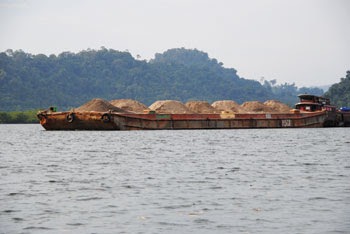Photo by: Sovan Philong
A village teacher conducts a class last week in Neak Leung in Prey Veng province. Experts say that better educational opportunities, particularly those focusing on vocational skills, could help Cambodia overcome a skills shortage and foster greater economic development.
via Khmer NZ News Media
Wednesday, 09 June 2010 15:01 Jeremy Mullins
Analysts say a skills shortage has slowed further development in the Kingdom
CAMBODIA is experiencing a skills and talent shortage hindering further development, experts say, agreeing with international assessments that education could be better tailored to meet employers’ needs.
Calling it a “global crisis in education”, World Economic Forum (WEF) on East Asia participants said in a release that education was not meeting employers' demands in countries around the world.
“Nation-building is about developing our human resources. The people are the most important. But in human resource development, we are falling behind,” forum participant and Lippo Group of Indonesia chief executive officer James Riady said, according to a release.
USAID Cambodia Micro, Small, and Medium Enterprise chief of party Curtis Hundley said extending domestic value-added manufacturing will require increasing training for technical vocations.
“Garments are the main export industry in Cambodia. All production for garments could be in Cambodia – buttons, zippers, fabric could all be manufactured here, but right now the industry is all CMT: cuts, make and trim.”
The domestic business environment can be very difficult, and it is often hard to attract investment, he said. A supply of Cambodian technical experts and effective middle and upper management would help draw more manufacturing, not just in the garment industry, he added.
Cambodia faces a number of challenges in order to solve a domestic shortage of skills and talent, HR Inc Cambodia general manager Sandra D’Amico wrote in an email.
“Our biggest challenge is the lack of labour market information systems and links between industry and education institutions to ensure education meets the needs of industry.”
Coordination between different educators could also be improved, she said. “Technical vocational training (TVET) and Higher education need to compliment each other, not compete with each other.”
Standardisation of accreditation, and better marketing of educational possibilities would also help address the shortages, she said. “At the end of the day, people need a job.”
D’Amico recommended focusing on technical training to develop skills in the economy, and improving information dissemination as to opportunities to help bridge the education gap.
“There are too many university graduates that are doing jobs suitable for technical vocational training graduates.”
Despite warning that a crisis in education is under way, World Economic Forum panelists said that East Asia nations have reason for optimism.
“You have talented and motivated people who excel. But what do we do to unlock that potential?” Viet Thai International Joint Stock Company chief executive officer David Thai said, according to a WEF release. The WEF on East Asia was held June 6 and 7 in Ho Chi Minh City.
Cambodian Skills Development Centre (CASDEC) Director Tep Mona said one domestic attraction to foreign investors is the inexpensive labour available domestically.
She said 80 percent of middle and upper management at the Kingdom’s garment factories are foreign expatriates, and that foreigners have greatly assisted in developing the sector with their knowledge, but that it is time to develop domestic employees capable of doing the job.
“Low labour costs, if combined with the right skills, could make the industry very competitive,” she said, and added that such a combination could entice other industries to enter the domestic market.
“If we have skilled people who can do the job, factories will stay longer.”
The present education system produces plenty of graduates of higher education, but could better address the needs of industry, she said.
To develop middle management capable of working in the garment sector or other industries, CASDEC has begun offering a certificate program for management.
The domestic skills and talent shortage creates challenges for businesses operating in the Kingdom, Sandra D’Amico said.
The deficiency results in "a big need for employers to do on-the-job training as well as invest in training and building their own workforces”.






























